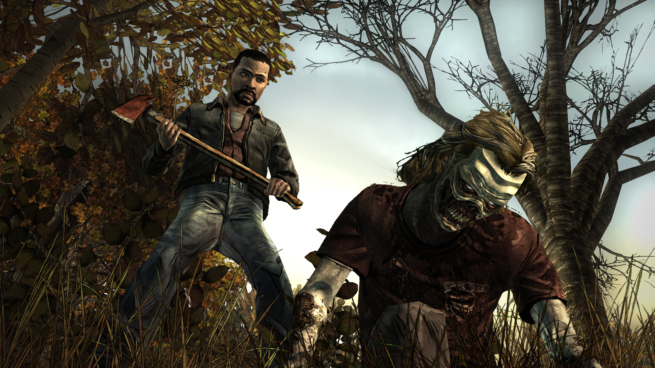
Player choice is an important aspect of Telltale’s episodic adventure game The Walking Dead. Based on the comic book series by Robert Kirkman, it tasks players with making difficult, often morally ambiguous decisions. Yet, according to a new statistics trailer for The Walking Dead Episode 2: Starved For Help, most people try to make the “right” choice even if it means endangering themselves or others.
[aditude-amp id="flyingcarpet" targeting='{"env":"staging","page_type":"article","post_id":509708,"post_type":"story","post_chan":"none","tags":null,"ai":false,"category":"none","all_categories":"games,","session":"B"}'](Warning: The rest of this article contains major spoilers for The Walking Dead)
When faced with a crossbow-wielding crazy woman, 87 percent of The Walking Dead players chose to wait instead of shooting her in cold blood, according to the trailer. The majority of players (85 percent) also decided to chop off high-school teacher David’s leg to save him from approaching walkers, and most also chose to spare the life of demented dairy farmer Andy St. John (80 percent).
Telltale Games senior director of marketing Richard Iggo said the development team finds the statistics fascinating.
“Some of the stats we’ve seen coming back from player decisions have created a perception that even in dire times — and when faced with no-win situations where each decision is morally grey — the majority of people will try to do the ‘right’ thing if they can, even if there’s really no ‘right’ decision to be made,” Iggo told GamesBeat. “It’s fascinating because even when we offer players a decision where the apparently darker option might make sense from a purely logical point of view, they’ll often try to choose the ‘higher’ ground at personal cost even if that means being put in danger or having a relationship with another character suffer because of it.”
Iggo said The Walking Dead’s game engine tracks every decision players make. Statistics for the larger story-changing choices are displayed at the end of each episode, while the video trailers offer a more in-depth look into smaller, more subtle choices that help shape series protagonist Lee Everett’s personality.
“One of my favorites is where we see people stop punching Andy St. John,” Iggo said. “If you’ve seen the trailer, you’ll know that we’re almost up to 1.5 million punches on Andy. In that scene, you wail away on him until you see a wide-angle shot of the other survivors watching you including the impressionable Clementine. The camera then cuts back to a first person perspective, and you can continue to strike, but what we see is that most people stop. They realize that they’re being watched and that people are forming an opinion of them right there, and most people don’t want to be seen as a monster even in light of what the St. John family did. Most people take the higher ground, get up, walk away, and leave Andy to his fate.”
One choice not covered in the statistics trailer involves a moment early in Episode 2 where the player must pass out four pieces of food among the camp’s ten hungry survivors. Unsurprisingly, the children — Clementine and Duck — were the most picked, followed by Mark. But it’s the fourth pick, the hard-as-nails curmudgeon Larry, that most surprised Telltale. “People chose to feed the guy that had been nothing but trouble since they met him, but I guess they felt sorry for him or his daughter Lilly. Or maybe they hoped that, by feeding him, he might tone down his aggression towards them and perhaps not reveal to the group what he knows about [Lee’s] past,” said Iggo.
Since Larry meets a gruesome and disturbing end in Starved for Help, players will never know if their act of compassion worked. And if you thought Larry’s death was shocking, Iggo said, “You haven’t seen anything yet.”
[aditude-amp id="medium1" targeting='{"env":"staging","page_type":"article","post_id":509708,"post_type":"story","post_chan":"none","tags":null,"ai":false,"category":"none","all_categories":"games,","session":"B"}']
“In terms of absolute heartbreak in the episodes we’ve seen so far, [Episode 3: Long Road Ahead] takes the crown. You’re really going to have your morals tested right from the opening scenes of the episode, and since the bulk of people who play the game seem to make decisions based on what they would actually do in the situations presented to them, this episode is going to hold up a very dark mirror for a lot of people.”
